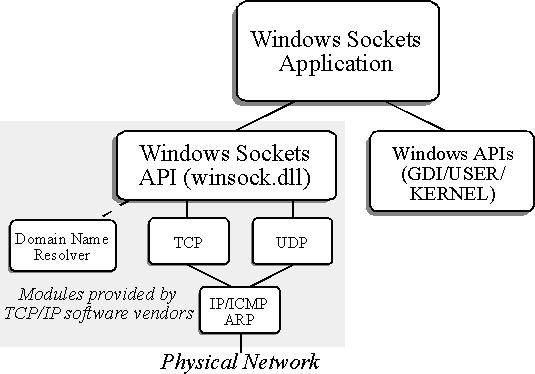
In today's heterogeneous networks, one thing is clear: closed, proprietary standards are unwelcome. As the business of networking computers has evolved over the last two decades, hardware and software providers have learned that cooperation can yield very rewarding results. The Microsoft® Windows® Sockets effort represents an extremely usable open networking standard developed by over 20 cooperating vendors in the networking community.
The Windows Sockets API (Application Programming Interface) provides applications with an abstraction of the networking software below it. The present Windows Sockets specification, version 1.1, defines this abstraction for the TCP/IP, or Internet protocol family. For many, the TCP/IP protocols represent the greatest common denominator between the many distinct systems that make up today's enterprise networks. In fact, the TCP/IP protocols were developed in a manner similar to the Windows Sockets specification: open cooperation between many interested parties with different requirements. Windows Sockets doesn't stop at TCP/IP, however. The level of abstraction is complete enough to support other protocol families as well, for example: the Xerox® Network System (XNS) protocols, Digital's DECnet protocol, or Novell®'s IPX/SPX family. For many, the attraction to Windows Sockets is the ability to develop and/or run a Windows Sockets-compatible application over any vendor's Windows Sockets-compliant TCP/IP implementation, while providing the ability to move the application easily to other networking protocols.
Windows Sockets is implemented as a DLL (dynamic link library) provided by the vendor of the given network protocol software. A Windows Sockets developer leverages the APIs from both Windows Sockets as well as the Windows operating system itself to create a network-aware Windows application. The following diagram illustrates the basic building blocks used to create a Windows Sockets application. The areas shaded in gray are provided by the network protocol vendor.

The basic building blocks of a Windows Sockets application
The goal of this article is to offer developers a taste of this powerful new API. We assume that the reader is familiar with both networking basics as well as Windows programming. To keep things simple, we will focus our discussion on using Windows Sockets to develop network applications over the TCP/IP protocol family, but will include several tips on how other transport protocols are supported with Windows Sockets.
Today, over 30 application vendors have announced the development of commercial applications to Windows Sockets such as X-Windows servers, terminal emulators, and email systems. Several commercial and public domain versions of Windows Sockets-compliant TCP/IP stacks are available, and both Microsoft Windows NT™ and Chicago include Windows Sockets implementations which are capable of supporting transport protocols in additions to TCP/IP, such as IPX/SPX. Many corporate developers are standardizing on Windows Sockets for heterogeneous client-server application development under Microsoft Windows.
Whether you're developing client-server, peer-to-peer, or distributed network applications, Windows Sockets represents a standard networking API for Microsoft Windows which will allow you to develop flexible networking applications for TCP/IP and other networking protocols.